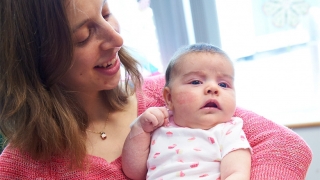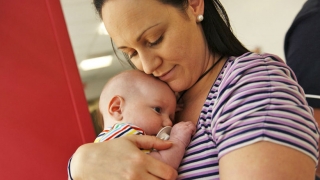Diazoxide (Proglycem)
This resource is for Children’s Hospital of Philadelphia patients with hyperinsulinism who are prescribed diazoxide to manage low blood sugar.
Important Information:
- Diazoxide, also known by the brand name Proglycem®, is used to treat low blood sugar (hypoglycemia) caused by hyperinsulinism. It works by blocking the release of insulin from the pancreas.
- Diazoxide is a thick liquid suspension at 50 mg/mL concentration.
- Diazoxide is given by mouth, 2 times a day. It can last up to several days.
- The amount of medicine your child needs depends on their blood sugar levels and their body weight. Doses range from 5-15 mg/kg/day. As the dose gets higher, the side effects of the drug become greater.
- Side effects that may be seen with diazoxide:
- Swelling around the eyes, face, and other parts of the body. Your healthcare provider may prescribe a medicine to get rid of extra fluid.
- Extra hair growth on the body. This will go away about 6 months after the medicine is stopped.
- Less common side effects include:
- Nausea, and loss of appetite
- Low white blood cell or platelet cell count.
- Pulmonary hypertension, or high blood pressure in the lungs, causes the heart to work harder than normal.
- Your child will have ongoing screenings and labs at their endocrine clinic visits to check for these side effects.
- Your healthcare team will teach you how to check your child’s blood sugar and how to give glucagon if their blood sugar drops too low.
- Whether diazoxide will work for your child depends on the cause of their hyperinsulinism. If your child responds well to the medicine, they may remain on it for many years. However, the dose is not always increased as the child gets bigger. Your healthcare team will base the dose on how well their blood sugars are controlled.
Call your CHOP healthcare team with any questions, concerns or if your child:
- Is puffy
- Is weak or less active than usual
- Has trouble breathing
- Has any blood sugar less than 50 mg/dl
- Has more than 2 blood sugars in 1 week <60 mg/dl
- Has 2 blood sugars > 150 mg/dl in 1 week
- Has any blood sugar >200 mg/dl
If your child shows signs of a life-threatening reaction, call 911.

